Construction Management
Construction project management (CPM) or simply Construction Management (CM) is “a professional service that uses specialized, project management techniques to oversee the planning, design, and construction of a project, from its beginning to its end. The purpose of Construction Management is to control a project’s time, cost and quality.” Civil Engineers are often called on to manage building or infrastructure projects that are designed by others.
For a Construction Project Manager, please call us at (469) 294-8860.
 Construction Project Managers usually work on large, high budget projects like commercial real estate, transportation infrastructure, industrial facilities, or military infrastructure. These projects are usually called capital projects. In most every case, the Construction Managers works directly for the owner of the project to insure a successful project. For a large project the contractors and/or subcontractors may also employ project managers for their portion of the work and that person will work directly with the Owner’s Project Manager to coordinate the work.
Construction Project Managers usually work on large, high budget projects like commercial real estate, transportation infrastructure, industrial facilities, or military infrastructure. These projects are usually called capital projects. In most every case, the Construction Managers works directly for the owner of the project to insure a successful project. For a large project the contractors and/or subcontractors may also employ project managers for their portion of the work and that person will work directly with the Owner’s Project Manager to coordinate the work.
Hiring a Construction Manager
 Typically, for larger projects, and in my opinion for all projects, you want to hire the most experienced and most qualified construction manager or construction management firm for the job. This is called Qualification Based Selection, or QBS for short. QBS is required by law on federal and state sponsored projects, but should also be the case on large private projects as well.
Typically, for larger projects, and in my opinion for all projects, you want to hire the most experienced and most qualified construction manager or construction management firm for the job. This is called Qualification Based Selection, or QBS for short. QBS is required by law on federal and state sponsored projects, but should also be the case on large private projects as well.
The other way selection of a project manager has been done is called Low Bid. This method chooses the firm based on lowest price proposed to do the job for you. This method is fraught with problems. First, how do you know if the lowest bidder is experienced or qualified to oversee this project? You don’t, unless you’ve pre-qualified the bidders.
“Get the right people. Then no matter what all else you might do wrong after that, the people will save you. That’s what management is all about.” ~ Tom DeMarco
While price is a concern in all cases, the QBS approach also has a negotiation phase which allows the owner and the construction management firm to come to terms on the costs. I always say that a good consultant, be it a civil or structural engineer or construction manager, should be able to save the owner their fees. This is certainly true on large capital projects like roadway and bridge construction.
For a Construction Project Manager, please call us at (469) 294-8860.
Skills Required for Construction Managers
- Listening – Must be able to listen attentively to others in order to understand the points being made, and to ask relevant questions to glean a clear understanding.
- Speaking – Must be able to talk to others effectively.
- Critical Thinking – Must be able to use logic and reasoning to identify the advantages and disadvantages of alternative solutions, conclusions or approaches to problems.
- Coordination – Must be able to make adjustments based on the actions or needs of others on the project..
- Reading Comprehension – Must be able to understand work related specifications, plans and documents.
 Complex Problem Solving – Must be able to identify complex problems and review relevant information in order to develop and evaluate options and implement solutions. This should include consideration of the costs and benefits of potential options to choose the most appropriate one.
Complex Problem Solving – Must be able to identify complex problems and review relevant information in order to develop and evaluate options and implement solutions. This should include consideration of the costs and benefits of potential options to choose the most appropriate one.- Time Management – Must be able to manage personal time and the time of others.
- Management of Personnel Resources – Must be able to motivate, train, and oversee people as they work, and to identify the best people for the job.
- Negotiation – Bringing others together and try to reconcile differences.
- Active Learning – Continually reviewing the implications of new information to apply it to current and future problems and decisions.
- Monitoring – Must be able to monitor and assess the performance of yourself, other people and organizations to make improvements or take corrective action.
- Management of Financial Resources – Must be able to guide how money will be spent to get the work done, and accounting for these expenditures.
- Writing – Must be able to communicate effectively in writing to communicate with the contractors and owner of the project and to document the work done.
- Mathematics – Must be able to use math to solve problems that arise on the project.
- Management of Material Resources – Must be able to anticipate needs and to obtain the appropriate equipment and materials needed to do certain work.
- Systems Analysis – Be able to determine systems needed, to develop and implement those systems in order to achieve the most efficient work possible. Must also be able to see when a system may need to change based on changes in conditions, operations, and the environment on the project.
- Perception & Persuasion – Must be able to perceive others actions and reactions and then to persuade them to change their minds or behavior to fit the needs of the project.
- Service Orientation – Must be willing and able to look for ways to help people.
- Quality Control Analysis – Conducting tests and inspections of products, services, or processes to evaluate quality or performance.
- Teaching – Teaching others how to do something.
- Learning Strategies – Selecting and using training/instructional methods and procedures appropriate for the situation when learning or teaching new things.
- Operation Monitoring – Watching gauges, dials, or other indicators to make sure a machine is working properly.
“Those who plan do better than those who do not plan even though they rarely stick to their plan.” ~ Winston Churchill
5 Strategies of a Successful Construction Project Manager
Are you a project manager looking to try your hand at a role in the construction industry? At first glance, you may think construction project management takes the same skillset as any other PM career. Sure, it follows the traditional five phases of project management: initiation, planning, execution, performance and monitoring, and closure. But that’s where the similarities end. Construction project management diverges from a typical PM role by demanding and incorporating extensive knowledge of the construction industry, a unique and complicated field. Construction PMs average around 120 responsibilities, according to The Construction Management Association of America, which means they have to be more strategic and thoughtful in working with a slew of moving parts and constant change.
To ensure each responsibility is met and every architect, contractor, and supplier remains on schedule and budget, effective construction PMs should utilize tools and strategies that streamline their work. Fortunately, construction management has become more technical with the development of new tools to simplify many processes. It’s how you implement those tools that counts. These five strategies go beyond PM basics to prepare you for the intricacies of the role and direct your efforts toward success.
1. Create a flow of communication
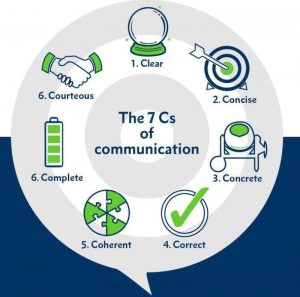 Among the most important elements of all project management, communication is essential to every phase of any construction project. Good news and bad news are equally important when preparing and implementing a building project, so you need to establish a flow of communication with everyone on the ground — and every stakeholder and supplier in the plan. This transparency will make the process smoother and will reduce the number of emails and phone calls whenever a problem arises.
Among the most important elements of all project management, communication is essential to every phase of any construction project. Good news and bad news are equally important when preparing and implementing a building project, so you need to establish a flow of communication with everyone on the ground — and every stakeholder and supplier in the plan. This transparency will make the process smoother and will reduce the number of emails and phone calls whenever a problem arises.
One of the simplest ways to create a flow of communication is a collaborative work management (CWM) tool. By syncing comments, attachments, and calendars, you can monitor news, budgets, and scheduling changes as they occur. A good CWM tool also allows you to relay these changes to other managers and accounting offices in real time, providing a nearly email-free method of project management. That means more time for you to spend at the construction site meeting contractors to coordinate the next stage of work.
2. Make a habit of continuous planning
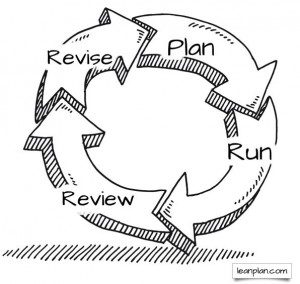 Planning may be the second of the Project Management Institute’s five phases of project management, but construction project managers should start planning long before actual construction begins, and continue revising and developing plans until the project ends. The design, pre-construction, and procurement stages of a construction project each require extensive planning — and each may need to be revised as the next stage unfolds. Anything can happen at a construction site. If you encounter unexpected environmental problems during the pre-construction phase, the design may need to change. Even slight adjustments can affect the overall plan and timeline.
Planning may be the second of the Project Management Institute’s five phases of project management, but construction project managers should start planning long before actual construction begins, and continue revising and developing plans until the project ends. The design, pre-construction, and procurement stages of a construction project each require extensive planning — and each may need to be revised as the next stage unfolds. Anything can happen at a construction site. If you encounter unexpected environmental problems during the pre-construction phase, the design may need to change. Even slight adjustments can affect the overall plan and timeline.
This remains true during the actual build. You will be working with seasoned professionals, often with decades of experience in electrical engineering, plumbing, scaffolding, and carpentry. While your contractors should be trusted, they still need focused direction to coordinate their efforts with each other. You’ll often need to work with them throughout the timeline to develop and refine plans as delays and equipment failures arise. Like any PM, you will execute and monitor developments, but the planning never ends in construction project management. Collaboration shouldn’t either.
3. Observe and ask questions
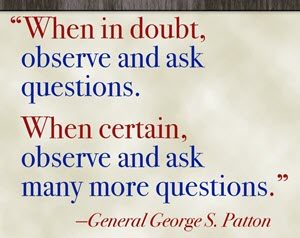 There is no industry in which PMs will be found just sitting at their desks, removed from the project and his or her team. Every good project manager becomes an integral part of the process, working figuratively and literally alongside others. Construction project management requires more attention and integrated effort than most industries, because the work is so physical. Field elements can drastically affect the workflow of construction projects. There will be many times when you need to actually see an issue in person before you can resolve it.
There is no industry in which PMs will be found just sitting at their desks, removed from the project and his or her team. Every good project manager becomes an integral part of the process, working figuratively and literally alongside others. Construction project management requires more attention and integrated effort than most industries, because the work is so physical. Field elements can drastically affect the workflow of construction projects. There will be many times when you need to actually see an issue in person before you can resolve it.
Familiarizing yourself with the construction site and the duties of every professional working under you will make you a better project manager. Construction is a constantly evolving industry, with new equipment, practices, and advancements every year. You need to continually educate yourself and learn from others in order to administer and manage a successful project. A great deal of communication may be streamlined, but the work still requires regular site visits and conferences with the contractors and designers on the ground.
4. Use tools to monitor costs and budgets
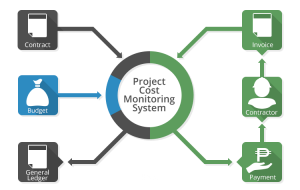 Most PMs have to think about money constantly, but the permits, wages, materials, and equipment of construction projects in particular are often exchanged between an array of financial sources. From the initial bidding process to the project closeout, construction PMs are responsible for tracking and monitoring all costs, especially as they relate to initial budgets. Ideally, you will have an accounting department for managing contractor invoices, but even then, you have to work alongside your accountants to ensure all direct and indirect costs are recorded.
Most PMs have to think about money constantly, but the permits, wages, materials, and equipment of construction projects in particular are often exchanged between an array of financial sources. From the initial bidding process to the project closeout, construction PMs are responsible for tracking and monitoring all costs, especially as they relate to initial budgets. Ideally, you will have an accounting department for managing contractor invoices, but even then, you have to work alongside your accountants to ensure all direct and indirect costs are recorded.
Considering every other responsibility of a construction project manager, tracking and monitoring finances manually without the assistance of software isn’t practical — or feasible. Even relatively small construction projects contain hundreds of moving parts and individual costs, so to remain effective you need to use software that can also manage costs and budgets. A good CWM tool should allow you and other collaborators to input costs, budget changes, and other calculations to keep track of your project’s finances, alleviating the need to coordinate with every participant or to calculate your budget. Additionally, this reduces time spent collecting signatures for every invoice, which means you and your contractors can devote more attention to the task at hand.
5. Implement automated reporting systems
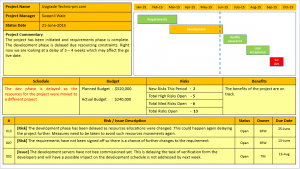 No construction project manager has the time to reply to hundreds of emails a day — or use the phone to call and address every question about budgets and progress. In addition to concentrating comments and schedules on one CWM, you can cut down further correspondence by implementing automated reporting systems. Construction project management requires the weekly distribution of various spreadsheets and status reports, and automated delivery tools will save significant time over the span of the build. This automation will ensure the right reports go to the right people on time, allowing you to focus on other tasks and communication. Other reporting systems, like Safety and Health Management, can prevent hazards, track incidents, and streamline worksite analysis when issues do arise.
No construction project manager has the time to reply to hundreds of emails a day — or use the phone to call and address every question about budgets and progress. In addition to concentrating comments and schedules on one CWM, you can cut down further correspondence by implementing automated reporting systems. Construction project management requires the weekly distribution of various spreadsheets and status reports, and automated delivery tools will save significant time over the span of the build. This automation will ensure the right reports go to the right people on time, allowing you to focus on other tasks and communication. Other reporting systems, like Safety and Health Management, can prevent hazards, track incidents, and streamline worksite analysis when issues do arise.

